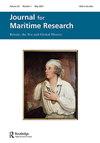Consuls and captives: Dutch–North African diplomacy in the early modern Mediterranean
Q3 Arts and Humanities
引用次数: 1
Abstract
The big pirate Cai Qian’s activities were also based on such a kind of local ecology. The last section maps the scene of how local elites in Fujian played their roles during the transformative periods (from Ming to Qing and during the late Qing) in terms of military leader, religious master, and literati or intellectuals. Zheng Chenggong (Koxinga) united the late-Ming maritime powers to resist the Qing and the Dutch; Master Yinyuan crossed the sea to Japan in search of military assistance to the antiQing agenda; Lin Zhen took a journey to the United States for teaching Chinese as well as learning the advanced western knowledge and left a valuable work in the mid-nineteenth century; Xu Jishe collected sources and published the famous Yinghuan zhilüe (A Short Account of the Maritime Circuit) in Fuzhou for ‘opening the eyes to observe the world’ in terms of the ocean. From these solid case studies, Yang moves further to reflect upon how to narrate Chinese maritime history. This also echoes his earlier searching for the ocean and the fate of the Chinese civilisation. Taking Mediterranean civilisations as a measure, some scholars argue that China had a maritime culture, but it was not a maritime civilisation. Leaving alone the dubious debates on culture and civilisation, Yang doubts whether there was only one civilisation in a nation-state (not to mention an empire). Yang points out that in a compound civilised state, a civilisation not dominated by a main discourse or even a ‘historical choice’ still is a civilisation. Furthermore, limiting Chinese maritime culture to a certain region and regarding it as the characteristic of ‘local culture’ is improper (e.g. Fujian is ‘the most typical area of Chinese marine civilisation’). After all, this shallow observation cuts off the connection between the local and thewhole (Haiyangwenming lun yuHaiyang Zhongguo [The discourse ofmaritime civilisation and maritime China]). Due to the characteristic of a collection of papers, one might sometimes feel that the whole book is a little loose. However, on one issue of central importance, the evaluation of maritime China, the author does bring together his insights into both the particular and the general, the historical narrative and the historical discourse.执政官与俘虏:近代早期地中海的荷兰-北非外交
大海盗蔡谦的活动,也是基于这样一种地方生态。最后一部分描绘了福建地方精英在转型时期(从明到清和清末)如何在军事领袖、宗教大师和文人或知识分子方面发挥作用的场景。郑成功联合晚明海上强国抗击清荷;银元大师漂洋过海到日本寻求反清议程的军事援助;19世纪中叶,林震为教授汉语和学习西方先进知识而远行美国,留下了一部有价值的著作;徐继社收集资料,在福州出版了著名的《环环志》,以“开阔眼界,观察世界”。从这些坚实的案例研究中,杨进一步思考如何叙述中国的海洋历史。这也呼应了他早期对海洋和中华文明命运的探索。以地中海文明为衡量标准,一些学者认为中国有海洋文化,但不是海洋文明。撇开关于文化和文明的可疑辩论不谈,杨怀疑一个民族国家(更不用说一个帝国)是否只有一种文明。杨指出,在复合文明状态下,没有主流话语甚至“历史选择”主导的文明仍然是文明。此外,将中国海洋文化局限于某一区域并将其视为“地方文化”的特征是不恰当的(例如福建是“中国海洋文明最典型的地区”)。毕竟,这种肤浅的观察切断了局部与整体之间的联系(《海洋文明与海洋中国的论述》)。由于文集的特点,有时会让人觉得整本书有点松散。然而,在一个至关重要的问题上,即对海上中国的评价,作者确实将他的见解结合到具体和一般,历史叙述和历史话语中。
本文章由计算机程序翻译,如有差异,请以英文原文为准。
求助全文
约1分钟内获得全文
求助全文
来源期刊

Journal for Maritime Research
Arts and Humanities-History
自引率
0.00%
发文量
0
期刊介绍:
The Journal for Maritime Research ( JMR ), established by the National Maritime Museum in 1999, focuses on historical enquiry at the intersections of maritime, British and global history. It champions a wide spectrum of innovative research on the maritime past. While the Journal has a particular focus on the British experience, it positions this within broad oceanic and international contexts, encouraging comparative perspectives and interdisciplinary approaches. The journal publishes research essays and reviews around 15-20 new books each year across a broad spectrum of maritime history. All research articles published in this journal undergo rigorous peer review, involving initial editor screening and independent assessment, normally by two anonymous referees.
 求助内容:
求助内容: 应助结果提醒方式:
应助结果提醒方式:


